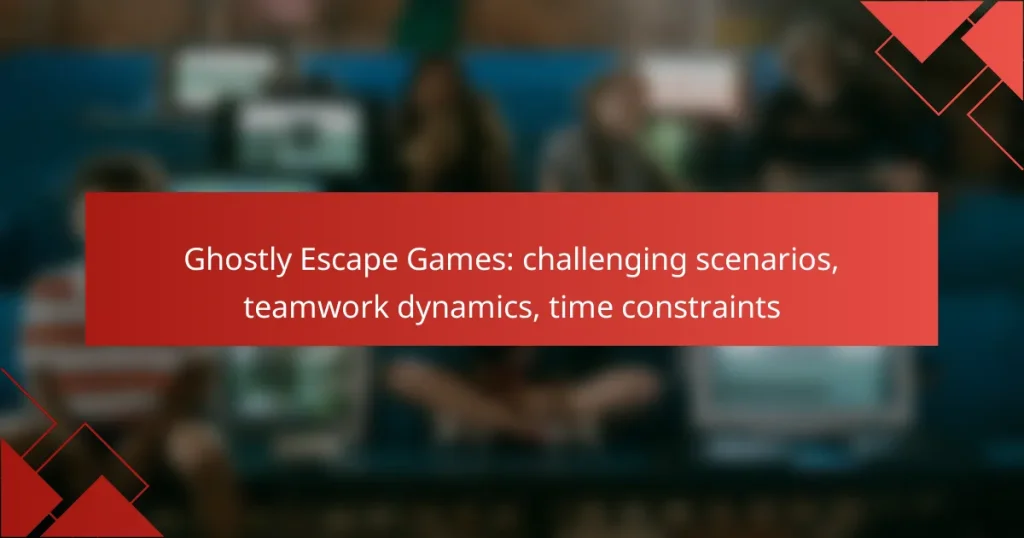Ghostly escape games offer an exhilarating blend of thrilling narratives and challenging puzzles, often set against eerie backdrops. These immersive experiences demand teamwork and quick thinking, making them perfect for groups seeking a unique adventure. With time constraints typically ranging from 60 to 90 minutes, players must collaborate effectively to solve challenges and escape before time runs out.

What are the best ghostly escape games in the United States?
The best ghostly escape games in the United States combine thrilling narratives with challenging puzzles, often set in eerie environments. These games require teamwork and quick thinking, making them ideal for friends or family looking for a unique adventure.
Escape the Room NYC
Escape the Room NYC offers a variety of immersive escape experiences, including ghost-themed scenarios that challenge participants to solve puzzles within a set time limit. Each room is designed with intricate details that enhance the spooky atmosphere, making it a popular choice for thrill-seekers.
Teams typically consist of 2 to 10 players, and the game lasts about 60 minutes. Participants must communicate effectively and collaborate to uncover clues and complete tasks, which can be a fun way to strengthen teamwork dynamics.
The Escape Game Nashville
The Escape Game Nashville features several ghostly escape rooms that test players’ problem-solving skills and ability to work under pressure. Each room has a unique storyline, often involving supernatural elements that add to the excitement.
Games are designed for groups of 2 to 8 players, with a time limit of 60 minutes. It’s advisable to book in advance, especially during weekends, as these popular escape games can fill up quickly. Teams should be prepared to think creatively and share ideas to succeed.
50 States of Fright
50 States of Fright is a unique escape game experience that takes players through various ghostly scenarios inspired by urban legends from different states. This format allows for a diverse range of challenges and themes, appealing to a wide audience.
Each game typically lasts around 60 minutes and accommodates groups of 4 to 10 players. Participants should be ready to engage with the narrative and embrace the eerie atmosphere, as teamwork is essential to navigate the puzzles effectively. Booking ahead is recommended to secure your preferred time slot.
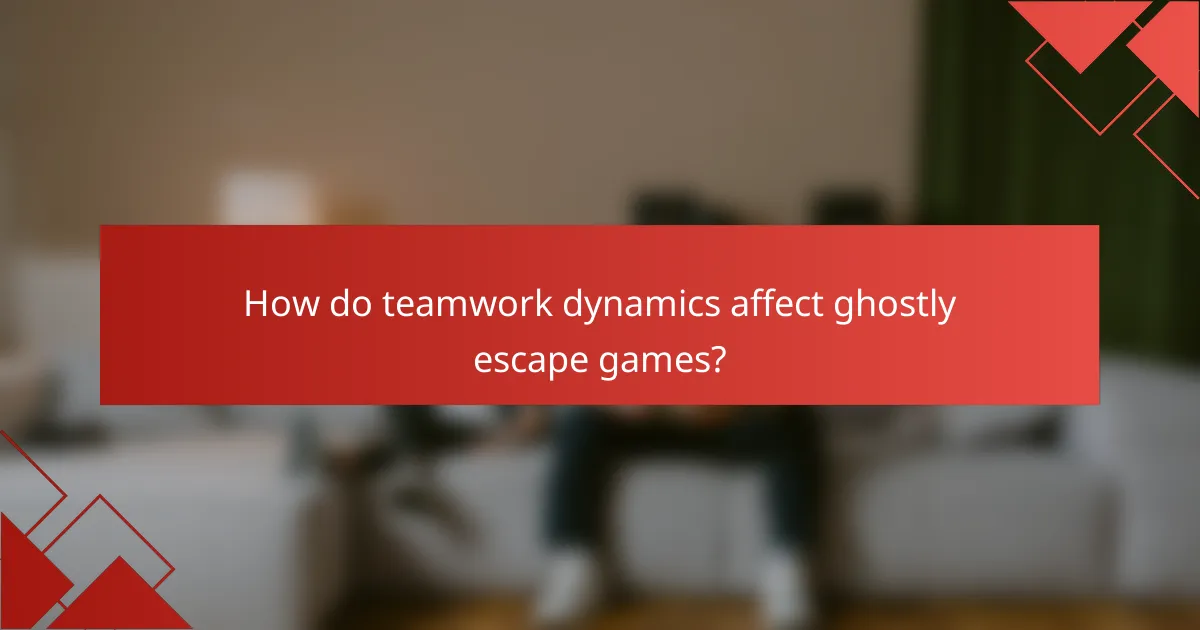
How do teamwork dynamics affect ghostly escape games?
Teamwork dynamics play a crucial role in ghostly escape games, influencing how effectively a group can solve challenges within tight time constraints. Successful collaboration hinges on clear communication, defined roles, and the ability to resolve conflicts quickly.
Communication strategies
Effective communication is vital in ghostly escape games, as players must share information rapidly to solve puzzles. Teams should establish a system for relaying clues and updates, such as designating a “clue master” to track hints or using hand signals to minimize distractions.
Regular check-ins can help ensure everyone is on the same page. For instance, after solving a puzzle, players can briefly discuss what worked and what didn’t, fostering a culture of open dialogue that enhances overall performance.
Role assignment
Assigning specific roles can streamline efforts and improve efficiency in ghostly escape games. Common roles include puzzle solver, clue gatherer, and timekeeper, each focusing on different aspects of the game. This division of labor allows players to leverage their strengths and ensures that no critical tasks are overlooked.
It’s beneficial to rotate roles during the game to keep engagement high and allow team members to experience various challenges. However, be cautious of overloading individuals with too many responsibilities, which can lead to confusion and mistakes.
Conflict resolution
Conflicts can arise during intense gameplay, especially under time pressure. Addressing disagreements promptly is essential to maintain team morale and focus. Teams should establish a protocol for resolving disputes, such as taking a brief timeout to discuss differing opinions calmly.
Encouraging a supportive atmosphere where players feel comfortable voicing concerns can prevent conflicts from escalating. Remind team members that the goal is collective success, and compromise may be necessary to move forward effectively.
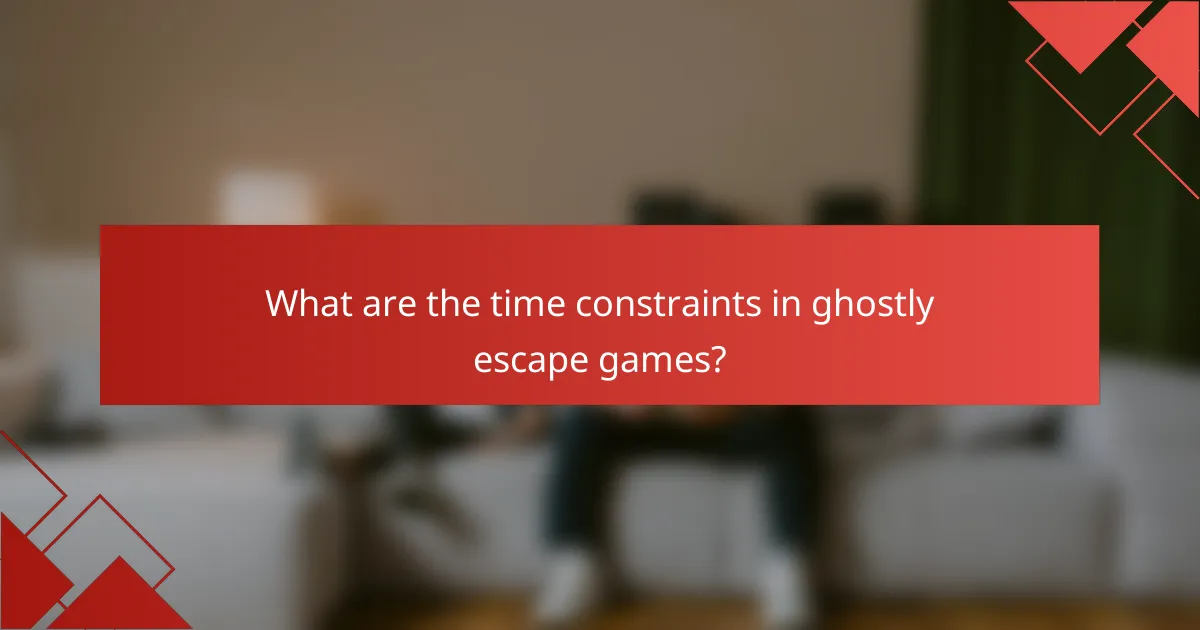
What are the time constraints in ghostly escape games?
Time constraints in ghostly escape games typically involve a set duration, often ranging from 60 to 90 minutes, for players to solve puzzles and complete challenges. These limitations create a sense of urgency, enhancing the overall experience and requiring effective teamwork and strategy.
Typical game duration
Most ghostly escape games are designed to last between 60 and 90 minutes. This timeframe includes time for briefing, gameplay, and debriefing. Some venues may offer shorter or longer experiences, but the standard duration is aimed at providing enough time to explore the scenario while maintaining excitement.
Time management techniques
Effective time management is crucial in escape games. Teams should establish a plan at the start, assigning roles based on strengths, such as puzzle-solving or searching for clues. Regularly checking the remaining time can help teams stay focused and adjust their strategies as needed.
- Divide and conquer: Split into smaller groups to tackle different puzzles simultaneously.
- Communicate frequently: Share discoveries and insights to avoid redundancy.
- Prioritize tasks: Focus on puzzles that seem more solvable or critical to progress.
Impact of time pressure
Time pressure can significantly affect team dynamics and decision-making in ghostly escape games. The urgency often heightens adrenaline, which can lead to increased focus and collaboration among team members. However, it can also cause stress, potentially leading to hasty decisions or conflicts.
To mitigate negative effects, teams should practice calm communication and maintain a positive atmosphere. Recognizing when to take a step back and reassess can be beneficial, allowing for clearer thinking and better problem-solving under pressure.
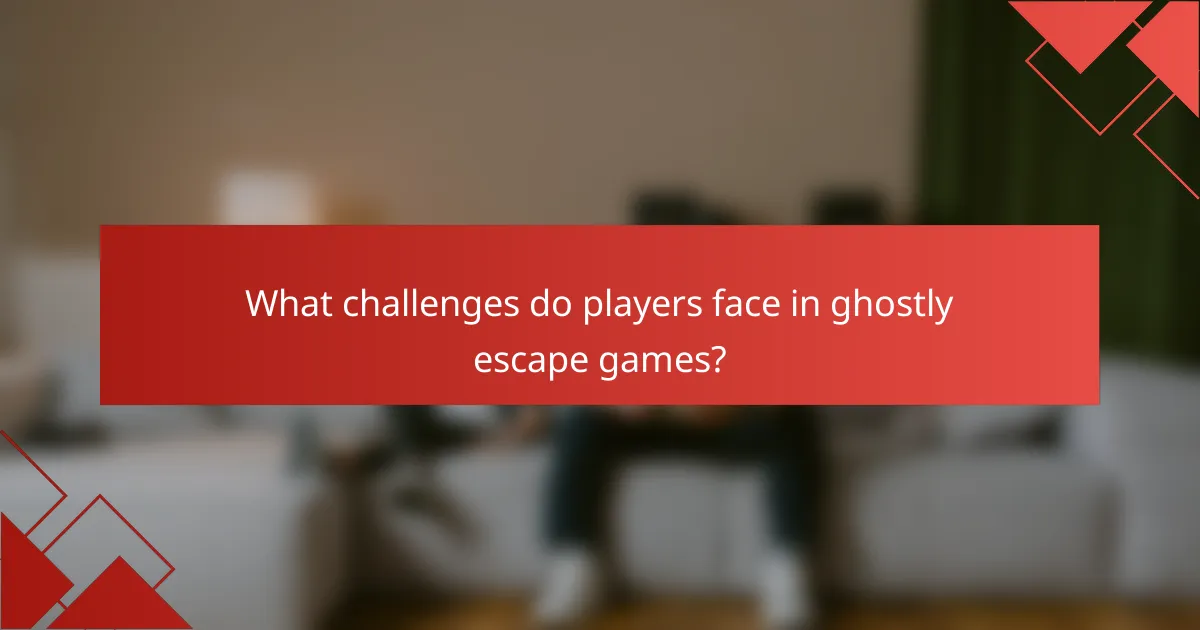
What challenges do players face in ghostly escape games?
Players in ghostly escape games encounter various challenges that test their problem-solving skills, teamwork, and ability to manage time effectively. These challenges often include intricate puzzles, environmental obstacles, and the dynamics of working as a cohesive unit under pressure.
Puzzle complexity
The puzzles in ghostly escape games can range from straightforward riddles to highly complex challenges requiring critical thinking and creativity. Players must decipher clues, solve logic puzzles, and sometimes manipulate physical objects to progress. A common pitfall is overthinking simple puzzles, which can waste valuable time.
To navigate puzzle complexity, players should communicate openly and divide tasks based on individual strengths. For example, one player might excel at word puzzles while another is better at spatial reasoning, allowing for a more efficient approach to problem-solving.
Environmental factors
Environmental factors in ghostly escape games often include dim lighting, eerie sounds, and themed decor that enhance immersion but can also distract players. These elements can create a sense of urgency and tension, making it crucial for players to stay focused on their objectives. Distractions can lead to miscommunication and mistakes, so maintaining clarity is essential.
Players should familiarize themselves with the layout and potential hazards of the escape room. Taking a moment to assess the environment can help identify useful clues and avoid pitfalls that could derail progress.
Team cohesion
Team cohesion is vital in ghostly escape games, as effective collaboration can significantly impact success. Players must communicate clearly, share insights, and support each other to tackle challenges efficiently. Poor teamwork can lead to frustration and wasted time, making it essential to establish roles and responsibilities early on.
To foster team cohesion, players should practice active listening and encourage each other. Regular check-ins about progress and feelings can help maintain morale and ensure everyone is on the same page, ultimately enhancing the overall experience.
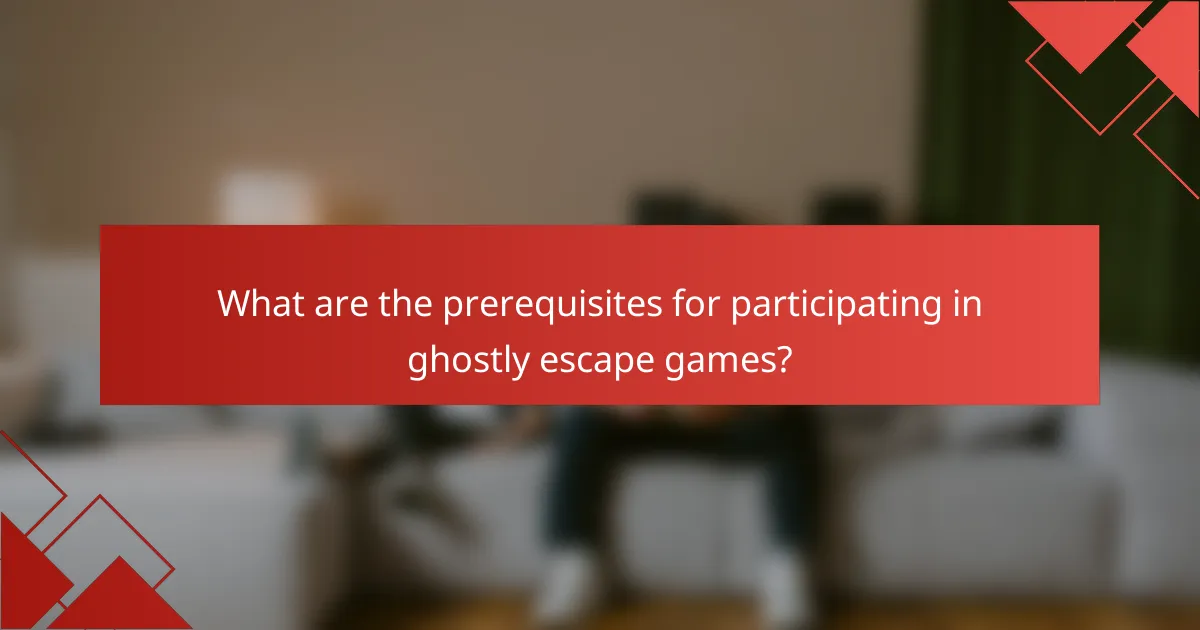
What are the prerequisites for participating in ghostly escape games?
To participate in ghostly escape games, players typically need to meet specific age, group size, and booking requirements. Understanding these prerequisites ensures a smooth and enjoyable experience for all participants.
Age restrictions
Most ghostly escape games have age restrictions to ensure safety and engagement. Generally, players must be at least 12 years old, though some venues may allow younger participants if accompanied by an adult.
It’s essential to check the specific age policy of the escape game venue, as some may have different age limits or require parental consent for minors.
Group size recommendations
Group size can significantly impact the experience in ghostly escape games. Most games accommodate teams of 2 to 8 players, with 4 to 6 being the ideal range for effective teamwork and communication.
Smaller groups may struggle with completing tasks efficiently, while larger groups can lead to confusion and reduced participation. Always verify the venue’s recommended group size to maximize your experience.
Booking requirements
Booking a ghostly escape game usually requires advance reservations, particularly during peak times or weekends. Most venues allow online booking, which is recommended to secure your preferred time slot.
Some escape games may require a deposit or full payment at the time of booking. Be sure to review cancellation policies, as they can vary by venue and may involve fees for last-minute changes.
